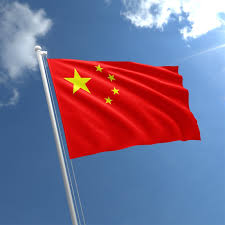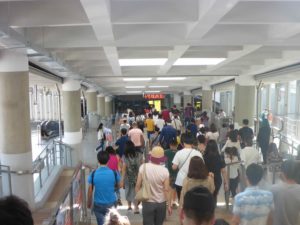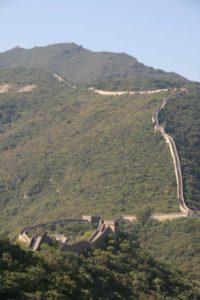China: managing its population and streamlining society. To what extent should the Chinese population be allowed to consist of fully conscious individuals? How to keep the system running without being questioned or imploding into anarchy?
Since the death of Mao we witness an extraordinary period, where 200 million Chinese rose into middle-class. Before, China was communist, where private wealth didn’t exist. With the rise of private fortunes, upcoming self-awareness could turn into a threat to the running system and ruling class. As the population passed the billion, to avoid starvation and social unrest as a consequence, things had to change. The main question was how to develop the country, organise, lead and control the “Billion” and how to maintain a controlled society, whilst the world turned more and more informed, global and open minded.
The Chinese are used to be led by emperors, party leaders, local bureaucracy and respect authority. Chinese politics though acknowledged, the system had to change and the style of leadership modernised. Discipline, structure and organization was imposed, which I knew before, but hadn’t guessed it to be so widely accepted by an uncritical and almost unaware Chinese society. Everybody plays its role, not questioning anything and “functions”. It is common sense, China, with its long history, number of inhabitants and a society based on the principles of hierarchy, can and will not be manageable if individual freedom of choice is an option to everybody. In order to avoid social implosion, revolutionary tendencies and granting survival to the ruling party, a formula combining social development, economic growth and wealth and political manipulation had to be found.
Since Deng Xiaoping and the establishment of economic special zones along the cost-line, building tens of thousands of state-owned factories and investing heavily into infrastructure, education and technological development, Chinas middle-class represents a self-assured and proud group of people as any other middle-class around the world, though absolutely uncritical! Despite being officially communist with 2 parallel systems, where the community imports more than the individual, I visit a capital I find difficult to judge ‘communist’.
Me following news regularly, I knew about these circumstances before. Just see how orchestrated military parades appear. Entire villages being eradicated for building new cities. Corrupt local authorities. Political opinions and open discussions being oppressed. Human rights not respected and activists incarcerated. Chinas Tibet policy. All examples for how the country is run by the political establishment. I, as a member of a democratic and free country, was wondering, how people could live under such oppressive circumstances. I cannot understand and believe, how to remain silent if things turn sour. But this is common practice in China. And it is achieved by avoiding its entire population to become ego-manic individuals. Collective awareness and surveillance is the key for keeping citizens quiet.
But how do you silently coordinate the vast majority of Chinas population? I had no idea which means and politics actually had to be put in place. But the answer is simple and already mentioned above: you avoid the development of the individual and focus on community by discipline, structure and organisation. By not letting emotionally based ambition rise and fostering enthusiasm if compliant to the system. As a result, you have a silent but functioning population.
There are many examples how China internal politics achieved collectivism rather than having to control 1.3 billion of individuals egoistically pursuing their own interest only. The one-child policy, though abolished recently, is unimaginable for us to be the ruling law. As a Chinese you have to abide to the law, if you don’t want to suffer socially or even be outcast by local authority working almost Stasi-like.
A nation-wide and uniform education system imposes clear-cut prerequisites in order to be able to study a desired subject and even the choice of university itself. Function and deliver and you’ll avoid problems! Dormitories for 6 are composed arbitrarily and do not offer any privacy. Clearly prescribed rotas at university and set goals to achieve force the young to comply and to forget personal eagerness for the own intellectual development. There is simply no room for personality-, character- and individuality-development.
Public toilets with no or barely any separation in-between each other exclude any private intimacy at a moment, us Europeans could under no circumstance imagine to be in a group. In fact, maintaining these types of toilettes, regardless if traditional or not, underpin the effort by Chinese politics to limit individuality at any expense. Looking from a European standpoint, sorting and delivering your digestion under public surveillance, what is needed more to not feel supervised, controlled and intimidated?
There are many more examples proving my impression of oppressed individuality, manipulating the masses and collectivity. But never having experienced and learned to be an individual, the Chinese accept and don’t question. I was asked by students what it actually means, to be “free to do what you want”. I argued it is a huge responsibility to oneself. They had issues to intellectually understand and to emotionally follow my thoughts. The Chinese social concept is genuinely different and not comparable to the open society of the West.
China is deeply intertwined with the world and sets pace: It is the biggest investor in US sovereign bonds, one of the biggest economies, aggressively claiming several territories initiating massive political disputes across SE-Asia, pursuing a well-chosen investing policy to preserve the supply of raw-materials and energy, political influence and global recognition, not interfering into any national politics and not tolerating any influence into its own. Combining this almost totalitarian attitude and global politics, is the Chinese way organizing the masses a competitive advantage compared to our open societies? Considering 20%-plus of the world population living in China, being cash-rich, longing for political respect and being nationalistically proud all based on the unimportance of the individual and always working result-driven, I wonder how the world may look like in 50-100 years. As much as I understand the Chinese way of fostering collectivism and individuals acting rather unconsciously, I fear, this can become the world’s running system. Capitalism for a small exclusive upper class, collectivity for the silenced rest. A paradisiac imagination for any politician, be it a full-hearted democrat or a full-swing dictator. I had utmost respect for the Chinese achievements, but now I kind of “fear” it’s impact on global development. But regardless, lifting 200 million out of poverty and starvation in such a short period of time is a massive success, if not taking the means to have reached so into consideration.






